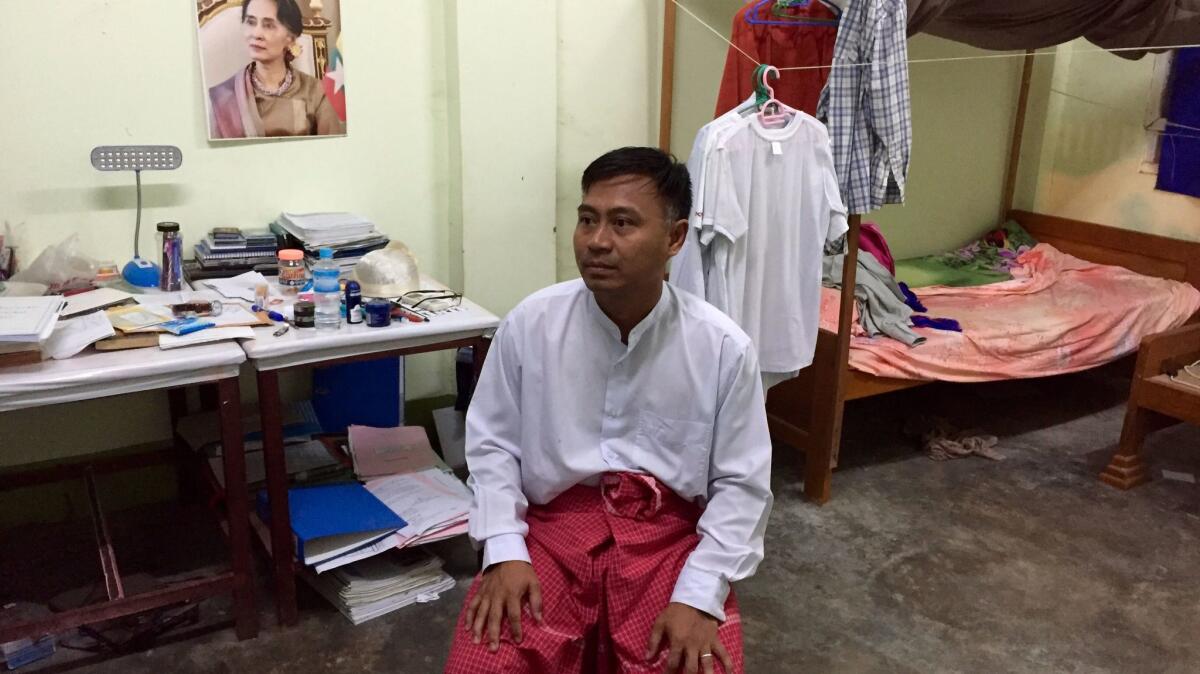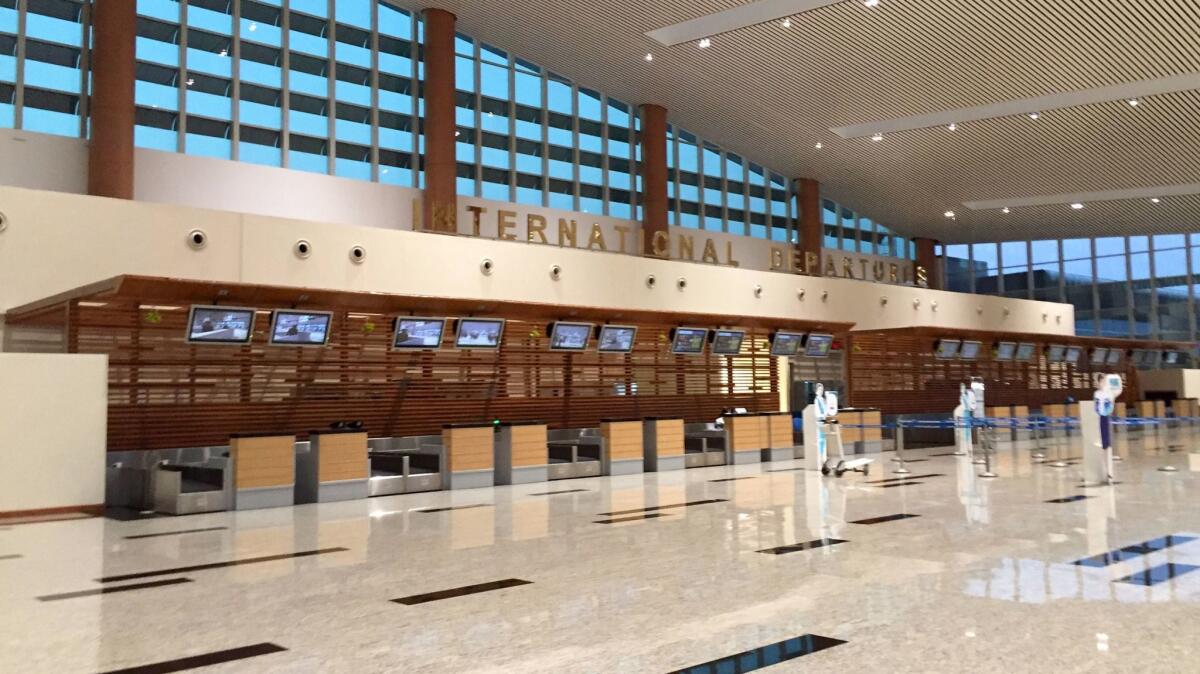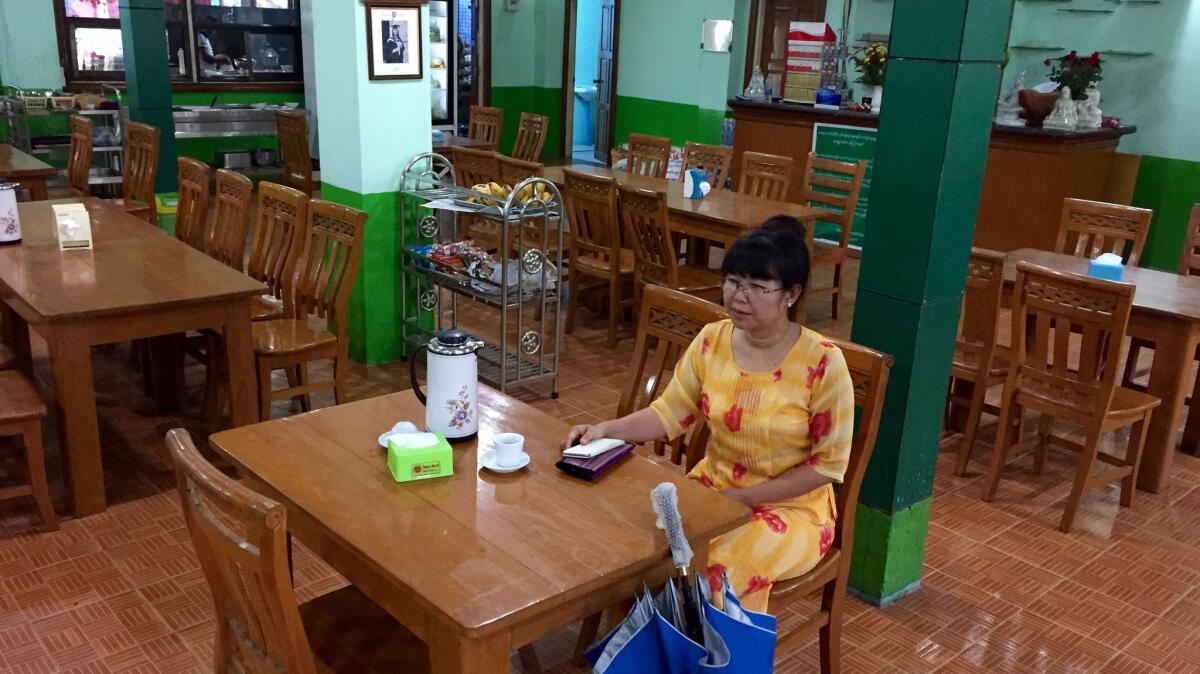In this desolate capital, lawmakers live like college students, sleeping in dorms and surviving on noodles

- Share via
Reporting from Naypyidaw, Myanmar — Tin Ko Ko Oo stepped off the bus on a humid Sunday evening carrying a binder thick with reading material and a duffel bag overstuffed with food and clean laundry.
He turned the key to his room, avoided the stacks of papers on the floor and set his bags down on a bunk bed next to his bike helmet.
He looked a bit like a college freshman returning to campus after a weekend at home. Except Tin Ko Ko Oo is 41 years old and a member of the parliament of Myanmar, coming back to one of the world’s most desolate capitals.
The generals who once ruled this country — formerly known as Burma — were so paranoid about security that they built a new capital in secret, announcing its existence just as it was being completed a decade ago. Atop a lush plain of rice paddies and sugar cane fields, the city seems almost to have been dropped from outer space, with 20-lane highways, grandiose hotels, government complexes so monolithic that they invoke comparisons to North Korea — and very, very few people.
The generals called their new capital Naypyidaw, which means “abode of kings.” The abodes of most of the 440 lawmakers who live here for a few months every year are far from regal.
Because the generals’ extravagant urban planning did not extend to housing — at least not for politicians who were unconnected to the army — dormitories were built to accommodate opposition lawmakers and civil servants.

Last year, the opposition swept into power after Aung San Suu Kyi’s National League for Democracy party — which led the five-decade struggle against military rule — won a historic majority in parliament. Hundreds of freshman lawmakers descended on remote Naypyidaw for the first time and found their way to the low, pastel-green dorms of Si Bin Guest House No. 2.
The spartan accommodations may feel familiar to the opposition lawmakers who spent time in prison under the military government.
Inside each 15-by-15-foot room are bunk beds with slender foam mattresses, a couple of hard wooden chairs, a desk and a bathroom with a tiny round mirror. There are no closets, so clothes and wet towels hang from the bedposts, the way your messy college roommate used to do it.
In Tin Ko Ko Oo’s room, a poster of Suu Kyi is taped to the wall above a desk cluttered with books, a cheap Chinese lamp and a deodorant stick. An empty bed serves as the kitchen-slash-pantry, strewn with pots, pans, spice jars and noodle packets that he cooks on an electric stove outside, on a tiny veranda where mosquitoes buzz in the fluorescent light.
There’s no TV, although in March wireless Internet was finally installed in the complex.
The boyish legislator from coastal Mon state attended university in Malaysia and then returned to his hometown to teach politics before contesting the 2015 elections as a member of Suu Kyi’s party. Growing up under the junta, he never dreamed he would serve in parliament. He betrayed no disappointment at the lack of luxury.
“My life as a member of parliament is like my life as a student,” he said. “Except as a student I didn’t have to cook.”
Their days are highly routinized, like an adult summer camp with briefing books. Few have cars, and the distances in Naypyidaw are too vast to cover by bike, so buses bring them to the mammoth, 31-building parliament complex every weekday morning at 8 and back to the dorms before dark.
In the evenings and on weekends, international agencies hold classes in English or parliamentary procedure. Sometimes a few lawmakers will gather on Saturday night at one of the city’s karaoke bars.
Most whose hometowns lie within driving distance elect to spend the weekends with their families and meeting constituents. Every other weekend, Tin Ko Ko Oo takes a six-hour bus ride back to Mon. On his lawmaker’s salary of less than $4,000, he can’t afford a car.
“Over here there is nothing to do but work, sleep and eat,” he said. “It is good because we have a lot of work to do to build our country. But even if you want to take a walk, there is nowhere to go.”

The city sprawls over 2,700 square miles, more than five times the size of Los Angeles, and although some 1 million people are said to have moved here, there are rarely more than a few in sight at any given time. Its main landmark, a golden pagoda, is a hollow replica of the renowned Shwedagon Pagoda in the former capital, Yangon; Junction Center, a multistory shopping mall with a cinema, sits alone by the highway, a few palm trees swaying lazily by the entrance.
Like other purpose-built capitals, including Brasilia in Brazil and Islamabad in Pakistan, Naypyidaw is obsessively organized — residential, military and commercial and hotel zones are divided and carved into grid patterns, set apart by miles and miles of asphalt. A 5-acre diplomatic area, meant for embassies, is deserted because most countries have kept their quarters in Yangon.
At an empty restaurant on one of the tree-lined streets near the dorms, another lawmaker from Suu Kyi’s party, Ma Thandar, quietly sipped a cup of tea. Her niece was visiting from their home in the southern Irrawaddy River delta region. That evening, she reckoned, they would cook chicken on her electric stove and steam rice in her rice cooker.
Then it would be back to her briefing papers.
“Sometimes I think I’m in prison,” she said, laughing.
The lifestyle is isolating, but parliament is only in session for about three months in a year. Some lawmakers even acknowledge they enjoy parts of it: There are few distractions, they can focus on work, Internet is relatively fast, and, unlike booming Yangon 200 miles to the south, traffic is nonexistent.
“Oh, there is great nightlife in Naypyidaw,” said a Yangon businessman who travels there regularly. “Do you meditate?”
Follow @SBengali on Twitter for more news from South Asia
ALSO
A brazen political killing shakes Myanmar, already teetering on the path to democracy
Born in America, Sriracha sauce tries its luck in Vietnam
More to Read
Sign up for Essential California
The most important California stories and recommendations in your inbox every morning.
You may occasionally receive promotional content from the Los Angeles Times.











